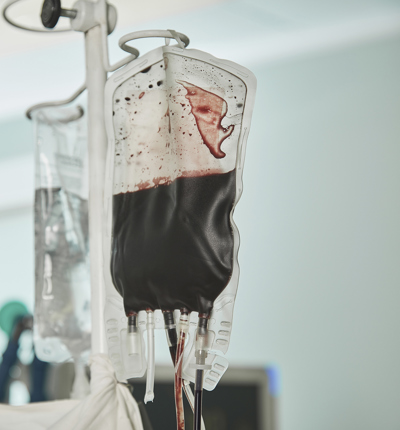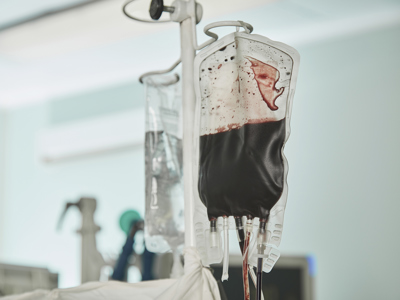
Woman given hepatitis C during infected blood scandal launches legal challenge over “unfair and discriminatory” compensation scheme
A woman who contracted hepatitis C during the infected blood scandal has launched a legal challenge to the government’s new Infected Blood Compensation Scheme, which she says unfairly discriminates against people with the virus.
Posted on 06 January 2025
The woman, who gave evidence anonymously at the Infected Blood Inquiry, says the compensation offered to people with the hepatitis C (HCV) virus is in most cases far less than it is for people infected with HIV during the scandal.
Under the compensation scheme, people infected with hepatitis B and C are categorised into a range of “severity bands” which affect how much compensation they are entitled to depending on their circumstances. However, people infected with HIV are all included in the same band, meaning they are entitled to the same compensation, set at a higher level than the most severe band for people infected with HCV.
The woman, who is a client of Leigh Day's, believes the compensation scheme has failed to recognise that HCV is a lifelong condition, just like HIV, and that many sufferers continue to be severely impacted, even after receiving treatment to ‘clear’ the virus.
She was given a transfusion containing contaminated blood in 1986 whilst she was pregnant with her first child. She says the following year she became constantly tired, her body ached, and her life became a struggle mentally and physically. She had to give up her job in 1998 when she began collapsing during shifts and has not been able to work since. By 2016 she had lost half of her body weight after becoming unable to tolerate food and being violently sick when she ate.
She has since been diagnosed with wide-ranging health conditions including thyroid cancer, depression, liver disease, osteoporosis, lupus and a mini stroke which has left her with weakness on the left-hand side and total hearing loss in her right ear. She continues to be unable to tolerate food and lives on prescription nutritional supplements due to the damage to her liver.
The woman says she believes the disparity in treatment between people with hepatitis C and those with HIV reflects the continuing under appreciation of the impact of hepatitis C. It is now recognised, in part due to the recent public inquiry chaired by Sir Brian Langstaff, that the consequences for those who contracted HCV during the scandal are at least as serious, and in some cases more serious, than the consequences for those who contracted HIV in the same period.
In setting up the new compensation scheme the Government relied on the advice of the Infected Blood Inquiry Response Expert Group which started its work in early 2024 and is entirely separate from Sir Brian’s inquiry. Despite the evidence from the six-year inquiry being publicly available, it does not appear that the expert group considered this before reaching its conclusions, which, in many respects, seem to be at odds with the direct experience of people living with the effects of infected blood. This was arguably not in the spirit of Sir Brian’s inquiry which put the people infected at its heart.
The woman adds that the hepatitis C community feels that there has been extremely limited engagement by the Infected Blood Compensation Authority (IBCA) expert group and the cabinet office despite a willingness by those infected and affected to assist. She believes there has been a lack of transparency in the process which goes against the recommendations made by Sir Brian in the Infected Blood Inquiry Report.
The legal action being brought on behalf of the woman by the law firm Leigh Day takes the form of a Judicial Review of the compensation scheme regulations on the grounds that people infected with hepatitis C have been treated unfairly and discriminated against, and the failure to properly engage with the community.
The woman and her lawyers at Leigh Day argue the banding of people solely infected with hepatitis C (mono HCV) compared with the lack of banding for people solely infected with HIV (mono-HIV) is both unlawful and irrational and that the difference in the payments is unfair and discriminatory. She is calling on the Minister for the Cabinet Office to scrap the severity bandings for those infected with HCV and address the disparity in the different levels of payments.
The woman is represented by Beatrice Morgan, solicitor at law firm Leigh Day and Philip Dayle of No.5 Chambers.
She said:
“I was a teenager when I was given infected blood in 1986 and was a grandmother by the time I was diagnosed in 2016. I have lived for the whole of my adult life with debilitating illness as a result of the blood transfusion I received nearly 40 years ago. I am not the person I was or that I could have been. My family and I have been the target of harassment and abuse from neighbours who found out I had hepatitis C. After everything I have been through, I am still having to fight the government for recognition of the impact of the infection on me and for fair compensation. The scheme splits those infected with hepatitis C into four severity bandings, yet there are no bandings for those infected with HIV. The way the scheme is set up means that I am entitled to far less compensation than a person who was infected with HIV, despite the ongoing and devastating effect on my physical and mental health.”
Leigh Day solicitor Beatrice Morgan said:
“My client believes she and thousands of other people who contracted hepatitis C as a result of the infected blood scandal continue to face unfair and discriminatory treatment by the government through its new compensation scheme. The scheme is a devastating disappointment for those affected by the scandal, particularly after the findings of the Infected Blood Inquiry earlier this year which vindicated those who had raised concerns for decades. The government accepted that there was a Moral Case for Compensation, yet it has fallen at the first hurdle by failing to properly engage with the community and create a scheme which appropriately reflects the damage caused by this healthcare disaster. This has perpetuated a long-standing mistrust by the community of those in Government, the opportunity to re-build this faith has been lost. This Judicial Review calls on the government to reconsider the terms of the scheme and to address the disparity in the different levels of payments.
Glenn Wilkinson, Chair of the Contaminated Blood Campaign (CBC) said:
“Following the release of Sir Brian Langstaff’s Infected Blood Inquiry report on the 20th May 2024, which vindicated the desperately sad experiences of our community, we were brought down to a new low the very next day when we consider to be the shockingly low levels of compensation being offered to the mono Hepatitis C community.
“In addition, the extra criteria being applied to the mono Hepatitis C community is hugely complex with extra stages and other criteria being applied to our infected HCV victims. In sharp contrast we saw no similar stages or criteria being applied to HIV victims.
“Neither the Conservative nor Labour governments have made any real attempts to consult with our community in any meaningful way. They say the decisions they have made are based on expert advice while at the time continually refusing to make that advice available to us.
“While many may consider mono Hepatitis C to be the more benign infection, the truth is very different. Expert statisticians’ advice to the Infected Blood Inquiry has proved that mono Hepatitis C is not only just as big a killer as HIV, it has actually cost more lives within our community than HIV ever has or ever will, a fact that CBC would have made clear to any Government had they bothered to consult with us properly at the very beginning of their decision making on compensation.
“It is often stated that two or more infected blood victims continue to die every week but what most people fail to realise, or choose not to mention, is that the vast majority of those that continue to die are mono Hepatitis C victims.
“So, as we move into the Christmas period and on to the new year, all mono Hepatitis victims have to look forward to is a highly complex compensation scheme that we consider will fail the majority, and which will need to be fought vigorously for many months and possibly years to come.”

Beatrice Morgan
Beatrice Morgan is a senior associate solicitor in the human rights department.



